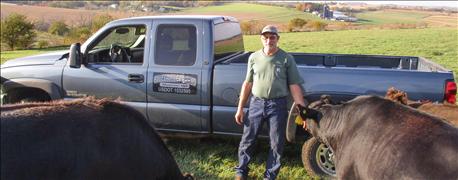November 1, 2016

Ask Mike Sulzer what he likes best about farming, and he'll probably point to his shop.
"I like my shop work," he says.
That's not to say he's not a serious farmer. He crops 500 acres of corn, soybeans, alfalfa and winter rye for a cover crop. He also has pasture for his 125 beef cows, four bulls and the offspring he finishes for beef or as replacement stock. Corn at 200 bushels and soybeans at 70 bushels are common yields, and he finishes up to 125 or more of the calves for sides, quarters and eighths to fill advance orders from consumers in the Milwaukee area and drive-up traffic at his Monroe farm. A New Glarus restaurant buys hamburger and has bought a full side of beef.
Family farm
Sulzer is the fourth generation of his mother's family to farm in Green County. He built his machine shop in 1972. He and his friends use to "soup up" cars and repair farm machinery.
"I'll pick up old machines to keep mine running," he says, laughing. He owns 11 Massey Ferguson tractors; six are in running condition.
"I don't want to buy a new tractor," Sulzer says.
Help in setting up his shop came from his father, Hans, whose own fully outfitted shop has been featured in magazines and on television. At 84, Hans still helps on the farm, along with a high school friend of Sulzer's.
Another 14 part-time employees work in Sulzer's sideline business of packaging timothy and alfalfa cubes and Berry and Carrot Nibblers for Kaytee Products, a pet and bird food retailer in Chilton. Sulzer buys the cubes and nibblers in bulk from Western and Canadian producers and packages them with Kaytee labels in an 80-by-150-foot commercial building on his farm.
His own cattle feed is stored mainly in five Harvestore silos — two with a mix of haylage and corn silage, two for high-protein alfalfa for finishing his market beef and one for high-moisture corn. He also harvests about 1,200 round bales each year.
Rotational grazier
In season, Sulzer 's cattle are on pasture. He rotation-grazes on "probably 100 acres of land that shouldn't be cropped" — either lower bottom land or higher ground in the county's rolling limestone hills. The former director of Green County Beef Producers has two separate herds that move among 10 paddocks on one farm and nine on another, "and we try to pasture off the corn land." In winter he feeds silage in the morning, plus a round bale, "and they're happy the rest of the day."
The cows are mostly black Angus, and he rents four Angus bulls from a neighbor. He's had Simmental and Charolais breeds in the past, but "buyers like black, and Angus beef marbles so good."
The 125 cows "are just about right for the size I have and the feed I have," Sulzer points out. "One hundred to 120 [finishing stock] fit real nicely in the fattening pens." It's a closed herd. He raises his own replacement heifers, does not vaccinate or use hormones, and hasn't had a sick animal in the feedlot because he doesn't bring in anything new, he says.
Renting his bulls works fairly well, Sulzer says. "I like to rotate the bulls. I fall-calve, so I'm breeding in winter. A week or so before Thanksgiving I let the bulls in. For 125 cows, you almost need four bulls, and it seems to work best when I rotate them for the first cycle."
Sulzer markets what he calls "natural beef — no hormones and no GMO crops." He uses starter commercial fertilizer but little else other than manure on his 80 acres of corn and 80 of soybeans. "I use manure well," he says — well enough to produce 200-bushel corn and 70-bushel soybeans. He plows under the winter rye cover crop. "That's really made a difference in the soil."
Sulzer's farm is online at sulzerbeef.com.
Buchholz writes from Fond du Lac.
About the Author(s)
You May Also Like




